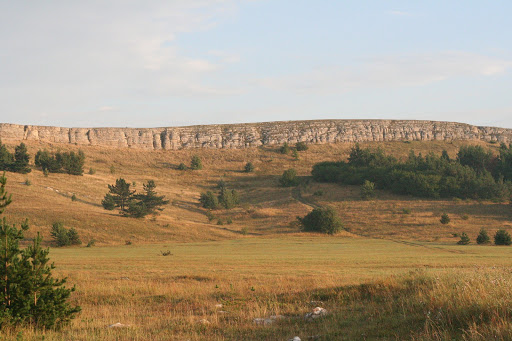 |
| commons.wikimedia.org |
The civil war raging for eight years in Syria has affected
seriously the economy. The Syrian state's GDP has shrunk dramatically and while the
Syrian Arab army restores the power of the Assad's regime internally, the need
for the costly rebuild of the country arises. The Syrian government understands
this and seeks to restore the economy.
Initially, internally the Syrian government aims to
take advantage of the private initiative to make investments. It is no
coincidence that it provides incentives to Syrian entrepreneurs to operate
within the country. Also, with a range of other measures, it intends to
strengthen the position of the Syrian pound by printing from the past year new currencies in order to channel them into the market. However, due to the
non-definitive cessation of hostilities and the incomplete restoration of the
sovereignty of the regime throughout the country, there is not much to be done
by the government.
On the other hand, as far as economic diplomacy is
concerned, the Syrian government's activity is remarkable. Initially, it
strengthens its ties with Iran. In late January 2019, the Iranian
vice-president met with the Syrian prime minister and signed 11 agreements and MoU's.
Those involved Iranian investments in renewable energy, infrastructure, culture
and housing, co-operation in the banking sector and broadly they established a long-term
economic co-operation.
The Syrian side is also in contact with the Jordanian
one. Jordan is interested in the reconstruction of Syria. The opportunities
presented for investments in the construction sector are significant, while the
raw materials produced in the country can be exported to the neighboring state.
Also, via the port of Aqaba, Jordanian territory can act as a
"gateway" for the introduction of various goods in Syria. Already,
delegations from the two countries have met to arrange their future
cooperation. Another important reason for the post-war reconstruction interest by
the Jordanian government is that the budget will be lightened, since no funds
will be channeled for the care of Syrian refugees.
An additional country that wants to help Syria and
with which the Syrian regime has good relations is Belarus. The country's
foreign minister has said he wants his country to help rebuild Syria and that
it respects its territorial integrity. At the same time, in a meeting with the
Syrian ambassador to Minsk, a bilateral political dialogue was decided.
An important development that demonstrates the success
of Syrian economic diplomacy is also the fact that the UAE wishes to contribute
on their turn to the rebuilding of the Arab state. It is not surprising that
their embassy will re-open in Damascus, while a Syrian business delegation has
had talks with other UAE businessmen for investments in agriculture,
infrastructure and tourism sectors. Indeed, Syrian entrepreneurs are aware of
the investment guarantees that the Assad’s regime gives. In addition, the Syrian
interest is also centered on green development.
In conclusion
It is clear that the Syrian government towards the end
of the conflict aims to establish good and cooperative relations with many
countries in order to facilitate the difficult task of post-war reconstruction.
The need for such actions is greater if it is taken into account that the West
with EU and the US as “champions” is preparing to apply new sanctions that will
totally hit the Arab country.
The measures, therefore, taken by the Syrian government
also concern the internal matters and the economic diplomacy and so far have
done well. There are many countries, including the BRICS, who seek to operate
economically in the post-war Syrian territory.
Finally, on the question of whether Syria is a country
offering investment opportunities, the answer is yes. However, the risk will be diminished in the near future that
the end of the conflict, except for an unpredictable event, is expected.
Indicative Sources
Channel News Asia, Syria
and Iran sign “strategic” economic agreement, 29 January 2019, https://www.channelnewsasia.com/news/world/syria-and-iran-sign--strategic--economic-agreement-11178330 (access: 10 February 2019).
Sarah Diaa, Gulf News, Syria in talks with UAE investors to rebuild economy after war, 2 January 2019, https://gulfnews.com/business/syria-in-talks-with-uae-investors-to-rebuild-economy-after-war-1.61560455
(access: 14 February 2019).
Belarusian Telegraph Agency, Belarus ready to help restore Syrian economy, 09 January 2019, https://eng.belta.by/politics/view/belarus-ready-to-help-restore-syrian-economy-117825-2019/ (access: 14
February 2019).
Samaha Nour,
European Council on Foreign Relations, The
economic war in Syria: why Europe risks losing, 11 February 2019, https://www.ecfr.eu/article/commentary_the_economic_war_on_syria_why_europe_risks_losing (access: 15 February 2019).
TheNational, Jordanians pin hopes on rebuilding
opportunities in Syria, 11 February 2019, https://www.thenational.ae/business/economy/jordanians-pin-hopes-on-rebuilding-opportunities-in-syria-1.825444 (access: 15 February 2019).
Maysam Bizaet,
Al- Monitor, Race for reconstruction
heats up as Syrian war winds down, 01 February 2019, https://www.al-monitor.com/pulse/originals/2019/02/iran-syria-cooperation-economic-agreements-trade-jahangiri.html (access: 15 February 2019).
Suleiman al- Khalidi, Angus McDowall, 02 October 2017,
Reuters, Hard choices for Syrian industrialists in ruins of Aleppo, https://www.reuters.com/article/us-mideast-crisis-syria-economy-insight/hard-choices-for-syrian-industrialists-in-ruins-of-aleppo-idUSKCN1C71B8


Δεν υπάρχουν σχόλια:
Δημοσίευση σχολίου